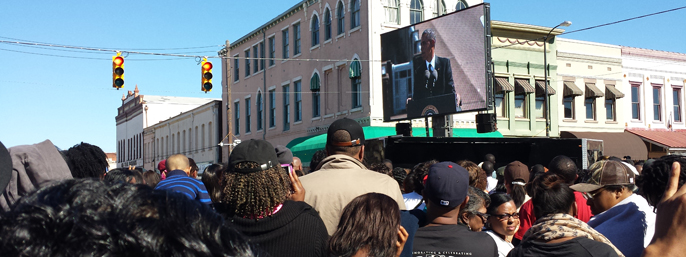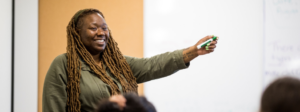On Saturday, March 7th, I stood at the mouth of the Edmund Pettus Bridge in Selma, Alabama, shoulder to shoulder with thousands of people from all walks of life. Together, we listened to President Barack Obama and Congressman John Lewis speak about the eventful day that took place there 50 years ago. In the stillness of the morning, listening to our president, I took a moment to reflect on equality and promise in America.
Fifty years ago, this very bridge was tainted with the blood and screams of 600 men, women and children. Now, it served as the backdrop for our nation’s first black president. In a way, it was a full circle moment: on the podium, President Obama represented the almost unimaginable hope of all those who fought for civil rights on Bloody Sunday. But as a former social studies teacher, I also couldn’t help but think: how would I have shared this experience with my students? How would I have made them understand the significance of this moment? And, moreover, how would I have helped them understand how much work we still have to do?
I believe history must be taught honestly, and that teachers must share events of the past from all angles—no matter how ugly or violent. Our children deserve to know the stories of ordinary people who were able to have an extraordinary impact on society. People who, even when the odds were stacked against them, had an unwavering determination to do what was right. Commemorating these moments reminds us how collective courage can dismantle the oppression we continue to face.
Today, we live in an America that has yet to live up to the constitutional rights granted to all of her citizens. What feels like a spate of young black men’s deaths at the hands of police is only a relatively small—and recent—example of this. The fight for racial equality in this country continues.

Teachers—as they always have—stand on the front lines. Students walk into classrooms every day, carrying their own experiences of injustice, as well as those of their families and their communities. Their teachers’ words, passion and commitment to preparing them to march forward despite this are all deeply important. Teachers need to be supported and prepared to have these difficult conversations with their students and talk about the messiness of America’s history and present. They also need to provide safe spaces where every child’s experience is respected.
As I stood in Selma, listening to the president, I considered how much work we still have to do in this country to achieve our dream of equity. Every child deserves a great teacher, a great principal and a great school—as well as a safe place to live, food on the table and parents who earn living wages for their work. I no longer have a classroom of students to teach each day; at TNTP, I work with school districts to support their efforts to put the right conditions in place to ensure all students are adequately prepared for college and careers. But I still feel the urgency that I did as a teacher in front of my students: to come to work every day, ready to do my part to move us one step closer to a country that lives up to the promises we make to our children.
This was the mission of the 600 men, women and children who peacefully marched 50 years ago. Those courageous heroes stood up to fight for our equality. We must represent and honor them by teaching future generations that equality still matters and that pursuing it is their most important work. We must model that for them, particularly as educators, by working every day to create the kinds of classrooms and schools that will nourish the change-makers of the future.
I left Selma renewed and refreshed to continue our march. I know our work will lead us to places that today, also seem impenetrable. But I also know that our work is nowhere near complete. We’ve only halfway crossed the bridge and we can’t stop now. There is so much left to do.








